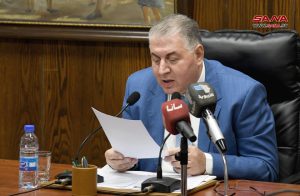Damascus-SANA
With the participation of Syria, a virtual ministerial round table organized by the United Nations Educational, Scientific and Cultural Organization (UNESCO) was held today, with the aim of discussing the normative framework for the ethics of generative artificial intelligence in education.
In addition to Syria, ministers and relevant officials from 17 countries around the world participated in the meeting via videoconference: Cameroon, the Democratic Republic of the Congo, Ireland, Mali, Slovenia, Sri Lanka, Tunisia, Venezuela, Armenia, Bulgaria, the People's Republic of China, Canada, Ivory Coast, Italy, South Africa, Uzbekistan and Spain.
In Syria's speech, the Minister of Education, Dr. Darem Tabbaa, explained that the use of generative artificial intelligence in education is a necessity that requires the development of services similar to human educational capabilities that make the learner able to continuous scientific simulation according to foundations that allow him to provide data within a homogeneous technological human environment that achieves the desired development, without hiding the features of a sound social structure.
Minister Tabbaa pointed out that the problem of generative artificial intelligence in education lies in the fact that the content it produces is not always accurate or appropriate because it takes into account the truth in a limited way, and can produce biased information unlike the normal educational system, which depends on students acquiring knowledge, experience, intellectual ability and taking advantage of the opportunities provided by technology.
Tabaa explained that the Ministry launched an educational search engine to enable learners through generative artificial intelligence to access building the appropriate knowledge and skills to develop their capabilities, and enable them to safely and reliably access the knowledge and skills required to provide a qualified workforce in the future.
Participants in the meeting presented their views on generative AI in education, exchanged ideas on the governance and policy approach to generative AI, and reflected on its future implications on knowledge, learning and research, and the importance of working together to ensure the use of AI in improving education, strengthening human effectiveness, enriching human capabilities and contributing to sustainable development.
The meeting was attended from Syria by the Secretary-General of the Syrian National Commission for UNESCO, Dr. Nidal Hassan, the Director of Informatics, Dr. Yasser Noah, the Director of the National Center for the Development of Educational Curricula, Dr. Nadia Al-Ghazouli, the Director of Educational Supervision, Inas Mieh, and the Director of Educational Platforms, Mahmoud Hamed.
Rehab Ali
Follow SANA News on Telegram https://t.me/SyrianArabNewsAgency

